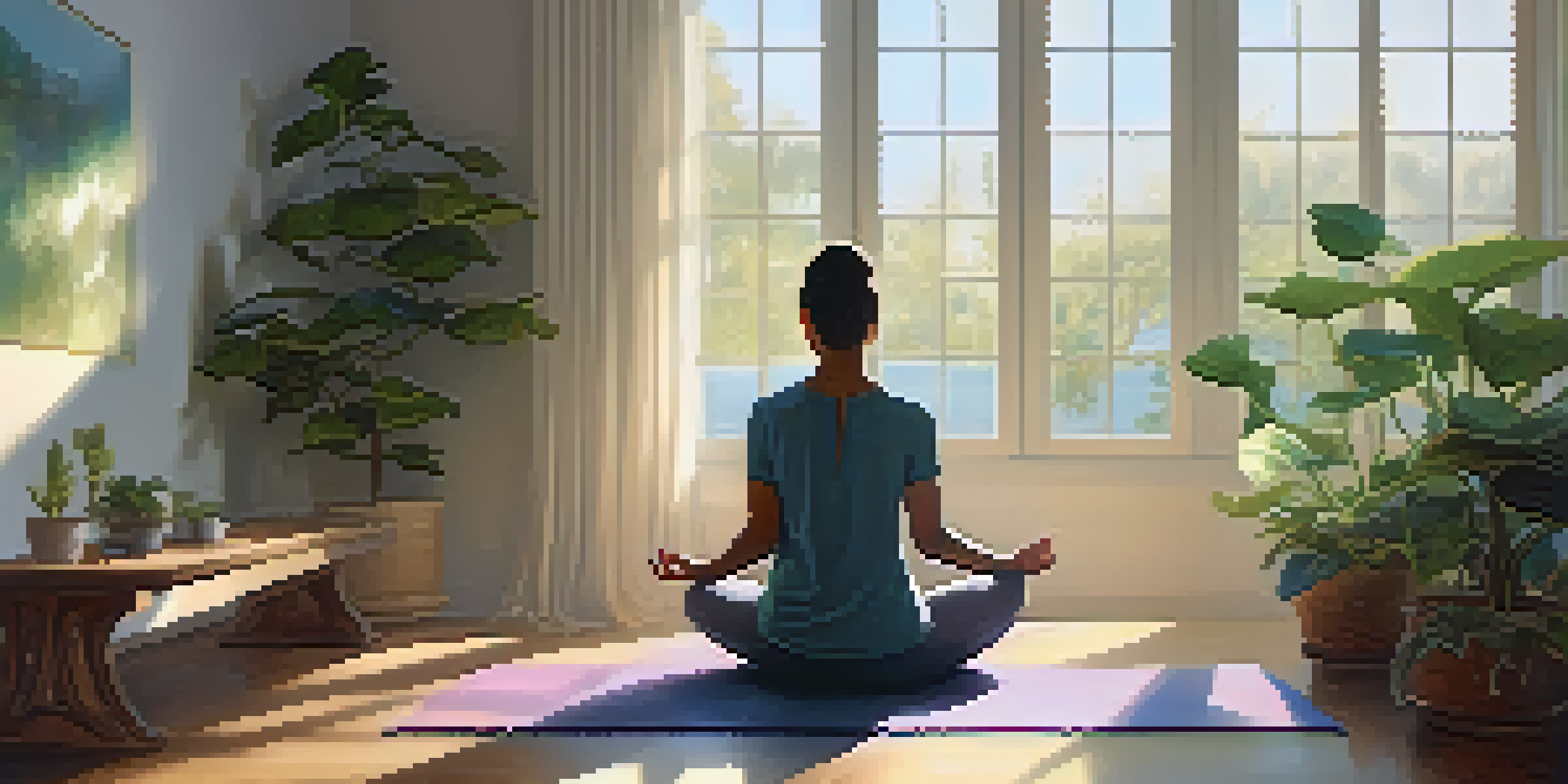The Connection Between Anxiety and Chronic Pain

Understanding Anxiety and Its Symptoms
Anxiety is a natural response to stress, often manifesting as feelings of worry, fear, or unease. Many people experience anxiety in different forms, such as generalized anxiety disorder, panic attacks, or social anxiety. Common symptoms include rapid heartbeat, sweating, and a sense of impending doom, which can be overwhelming and disruptive.
Anxiety is a normal and natural reaction to stress, but it can be overwhelming and disruptive if left unaddressed.
Beyond these emotional responses, anxiety can also lead to physical symptoms, such as muscle tension, headaches, and fatigue. This physical manifestation can create a cycle where anxiety increases pain sensitivity, making it difficult for individuals to cope with their chronic pain. Understanding these symptoms is crucial for addressing both anxiety and chronic pain holistically.
For those suffering from anxiety, recognizing these symptoms is the first step towards seeking help. Many individuals find relief through therapy, medication, or lifestyle changes, which can improve their overall quality of life. By understanding what anxiety feels like, individuals can begin to take proactive steps to manage their mental health.
Chronic Pain: A Complex Condition
Chronic pain is defined as pain that lasts longer than three months and can arise from an injury, illness, or even without a clear cause. Conditions such as fibromyalgia, arthritis, or back pain are common examples of chronic pain that affect millions of people. Living with chronic pain can be exhausting, impacting daily activities and emotional well-being.

The complexity of chronic pain lies in its subjective nature; what one person feels may differ vastly from another's experience. Factors such as genetics, mental health, and lifestyle choices all play a significant role in how pain is perceived and managed. This complexity makes it essential to explore the intertwined relationship between chronic pain and psychological factors like anxiety.
Anxiety and Pain Influence Each Other
Anxiety and chronic pain have a bi-directional relationship, where each condition can exacerbate the other.
Understanding chronic pain requires a multifaceted approach that considers both physical and emotional health. By acknowledging the depth of this condition, we can better appreciate how anxiety might exacerbate these pain experiences. This connection is critical for developing effective treatment strategies.
The Bi-Directional Relationship
The relationship between anxiety and chronic pain is bi-directional, meaning each condition can exacerbate the other. For instance, someone experiencing chronic pain may develop anxiety due to the uncertainty and limitations that pain imposes on their life. Conversely, heightened anxiety levels can lead to increased pain perception, creating a challenging cycle to break.
Chronic pain is a complex condition that not only affects the body but also impacts mental health.
Research shows that individuals with chronic pain are more likely to experience anxiety disorders than those without pain conditions. This correlation highlights the need for integrated treatment approaches that address both mental and physical health. By tackling anxiety, patients may find relief from their chronic pain symptoms and improve their overall well-being.
Recognizing this bidirectional link is essential for healthcare providers. Developing treatment plans that consider both anxiety and chronic pain not only supports patients more effectively but also promotes holistic healing. This understanding can lead to better outcomes and enhanced quality of life.
How Anxiety Amplifies Pain Perception
Anxiety can amplify pain perception through various mechanisms, including heightened sensitivity to pain signals. When someone is anxious, their body's fight-or-flight response kicks in, releasing stress hormones that can intensify pain sensations. This heightened awareness can make even mild discomfort feel overwhelming.
Additionally, anxiety may alter how the brain processes pain, leading to increased focus on pain sensations and a reduced ability to cope. The constant worry about pain can create a feedback loop where anxiety makes the pain feel worse, leading to more anxiety. Understanding this process is essential for developing effective coping strategies.
Holistic Treatment is Essential
Addressing both anxiety and chronic pain through a holistic approach leads to improved patient outcomes and quality of life.
Patients can benefit from techniques designed to reduce anxiety, such as mindfulness, cognitive behavioral therapy, or relaxation exercises. By addressing anxiety, individuals may experience a decrease in pain sensitivity, allowing for a more manageable lifestyle. This highlights the importance of treating both conditions simultaneously.
Coping Strategies for Managing Both Conditions
Managing both anxiety and chronic pain requires a toolbox of coping strategies. Techniques such as mindfulness meditation and deep breathing exercises can help calm the mind and reduce anxiety levels. Practicing these techniques regularly can create a sense of control over both anxiety and pain.
Physical activity is another essential component in managing both conditions. Engaging in low-impact exercises, like yoga or walking, can help alleviate pain while also reducing anxiety. This dual benefit makes physical activity a valuable tool for those struggling with chronic pain and anxiety.
Lastly, seeking support from mental health professionals, support groups, or friends can provide emotional relief. Sharing experiences and coping strategies can empower individuals to face their challenges together. Building a strong support system is crucial in navigating the complexities of anxiety and chronic pain.
The Role of Healthcare Providers
Healthcare providers play a pivotal role in addressing the connection between anxiety and chronic pain. By recognizing the interrelated nature of these conditions, they can create comprehensive treatment plans that target both aspects of a patient's health. This holistic approach is vital for effective management and improved patient outcomes.
It's essential for providers to ask about mental health during pain assessments, as this can reveal underlying anxiety that may be exacerbating pain. By integrating mental health resources into pain management programs, healthcare professionals can offer a more rounded approach to treatment. This collaboration can lead to better overall care for patients.
Coping Strategies for Better Living
Implementing coping strategies like mindfulness and physical activity can help manage both anxiety and chronic pain effectively.
Moreover, educating patients on the link between anxiety and chronic pain can empower them to take an active role in their treatment. Providing resources, referrals, and support can make a significant difference in their journey towards healing. A proactive approach from healthcare providers fosters resilience and hope in patients.
The Importance of a Holistic Approach
Taking a holistic approach to managing anxiety and chronic pain emphasizes the interconnectedness of mind and body. Instead of treating each condition in isolation, a comprehensive strategy considers how they influence one another. This perspective can lead to more effective treatments and improved quality of life for patients.
Holistic methods may include a combination of medical treatments, therapy, lifestyle changes, and alternative therapies like acupuncture or massage. Each component works synergistically to alleviate both anxiety and chronic pain, creating a more balanced approach to health. This comprehensive care model recognizes that patients are not just their symptoms but whole individuals with unique experiences.

Ultimately, embracing a holistic approach can empower patients to take charge of their health. By understanding and addressing the connection between anxiety and chronic pain, individuals can develop more effective coping strategies. This journey towards healing is a testament to the resilience of the human spirit.